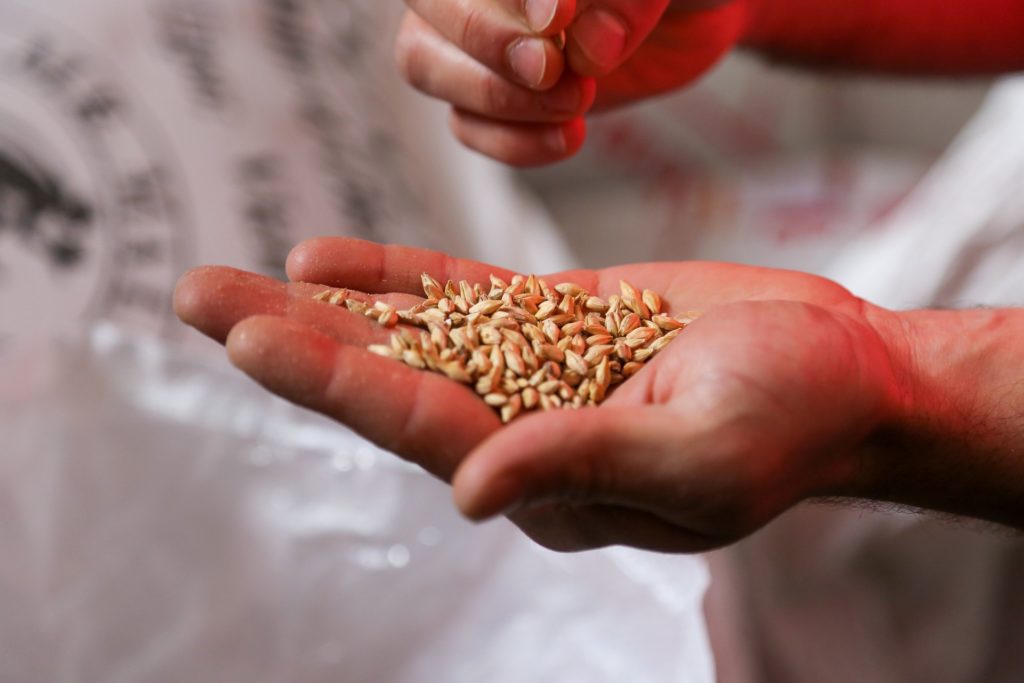The Bible doesn’t promote the concept of sowing financial seeds. The main reason is that Scripture never equates seed with money. Sowing financial seeds is an idea that comes from the Prosperity Gospel Movement.

Table of Contents
- Watch the Video
- What Does Sowing a Seed Mean Biblically?
- What Does God Say About Sowing a Seed?
- What Is a Sowing a Seed of Money (a Financial Seed)?
- What Is the Modern-day Origin of Sowing Financial Seeds?
- What’s the Meaning Behind Sowing a Seed of Faith?
- What is the Doctrine of Sowing a Seed?
- What Is a “Seed” Metaphor?
- What Does Sowing Spiritual Seeds Mean?
- What Does Jesus Say About Sowing a Seed?
- Recap
- Outsmart the False Teachers
Watch the Video
What Does Sowing a Seed Mean Biblically?

Sowing a seed biblically means giving of yourself, whether it be your finances, time, and/or resources, to further God’s kingdom and His will. It is an act of faith that reflects obedience to God’s Word and trust in Him even when the results appear.
This type of sacrifice brings blessings from God because it is done out of love for Him. Ultimately, this selfless giving lets us reap spiritual and natural rewards later.
What Is Biblical Sowing?
Let’s examine sowing from a biblical perspective. Sowing is used primarily as an agricultural term. According to Hitchcock’s Topical Analysis, it refers to tilling the ground or planting a seed into the ground directly after plowing. Smith’s Bible Dictionary also refers to sowing as placing a seed in the soil. Sowing is only used twice in the King James Version of the Bible.
Leviticus 11:37
37 And if any part of their carcase fall upon any sowing seed which is to be sown, it shall be clean.
King James Version (KJV)
Leviticus 26:5
5 And your threshing shall reach unto the vintage, and the vintage shall reach unto the sowing time: and ye shall eat your bread to the full, and dwell in your land safely.
King James Version (KJV)
As you see, there is no reference to sowing money. Now, let’s look at how the Bible speaks about seed.
What Is a Biblical Seed?
The KJV of the Bible mentions the seed 280 times. Additionally, the word seed has multiple meanings throughout the Scriptures. It refers to the following:
A Child, Offspring, or Descendants
Genesis 4:25
25 And Adam knew his wife again; and she bare a son, and called his name Seth: For God, said she, hath appointed me another seed instead of Abel, whom Cain slew.
King James Version (KJV)
Genesis 12:7
7 And the Lord appeared unto Abram, and said, Unto thy seed will I give this land: and there builded he an altar unto the Lord, who appeared unto him.
King James Version (KJV)
Semen or Sperm
Genesis 38:9
9 And Onan knew that the seed should not be his; and it came to pass, when he went in unto his brother’s wife, that he spilled it on the ground, lest that he should give seed to his brother.
King James Version (KJV)
Seed Placed in the Ground
Genesis 1:11
11 And God said, Let the earth bring forth grass, the herb yielding seed, and the fruit tree yielding fruit after his kind, whose seed is in itself, upon the earth: and it was so.
King James Version (KJV)
Joel 1:17
17 The seed is rotten under their clods, the garners are laid desolate, the barns are broken down; for the corn is withered.
King James Version (KJV)
What Does God Say About Sowing a Seed?
God encourages us to sow seeds as an act of faith, trusting that He will create a harvest from our planted seeds. In the Bible, God often speaks about sowing and reaping in our spiritual lives.
A few examples are found in Galatians 6:7-8 which says, “Do not be deceived; God is not mocked: for whatsoever a man soweth, that shall he also reap.” This verse teaches us that sowing good deeds with pure motives and serving others in love will result in a good harvest.
Likewise, if we sow malice and selfishness, it will ultimately lead to destruction. Therefore, by sowing a seed of kindness and generosity into our relationships with others, we can experience God’s blessing upon us and those around us.
What Is a Sowing a Seed of Money (a Financial Seed)?

The “financial” seeds of the modern church refer to money. In most cases, it’s so-called tithes and offerings. Money appears 140 times in the KJV Bible. In both the Old and New Testaments, examples of money include silver, pieces of silver, silver coins, and shekels.
The Old Testament
Joshua 24:32
32 And the bones of Joseph, which the children of Israel brought up out of Egypt, buried they in Shechem, in a parcel of ground which Jacob bought of the sons of Hamor the father of Shechem for an hundred pieces of silver: and it became the inheritance of the children of Joseph.
King James Version (KJV)
Job 42:11
11 Then came there unto him all his brethren, and all his sisters, and all they that had been of his acquaintance before, and did eat bread with him in his house: and they bemoaned him, and comforted him over all the evil that the Lord had brought upon him: every man also gave him a piece of money, and every one an earring of gold.
King James Version (KJV)
The Gospels
Matthew 27:3
3 Then Judas, which had betrayed him, when he saw that he was condemned, repented himself, and brought again the thirty pieces of silver to the chief priests and elders,
King James Version (KJV)
The New Testament
Acts 3:6
6 Then Peter said, Silver and gold have I none; but such as I have give I thee: In the name of Jesus Christ of Nazareth rise up and walk.
King James Version (KJV)
Acts 8:20
20 But Peter said unto him, Thy money perish with thee, because thou hast thought that the gift of God may be purchased with money.
King James Version (KJV)
Other biblical examples of money include mammon (Matthew 6:24), lucre (1 Samuel 8:3, Titus 1:7), and mite (Mark 12:42, Luke 12:59). Again, the Bible never uses the word seed as a substitute for money.
What Is the Modern-day Origin of Sowing Financial Seeds?

The concept of sowing financial seeds has its roots in the Prosperity Gospel Movement. For example, pastor and televangelist Oral Roberts often told his donors their donations were seeds. Roberts stated they would experience a supernatural increase for “sowing” their seed (or money) into his ministry. This evolved into what he later called the Seed Faith Doctrine. This doctrine proclaimed that sowing a seed (paying tithes and offerings) and exercising one’s faith could result in financial blessings.
What do we have here?
A seed is associated with money (including tithes and offerings). The sowers are Christians. The act of sowing involves giving money, giving offerings, and/or paying so-called tithes to a ministry (or church). Prosperity preachers use seed, sower, and sowing as metaphors. And this is a practice that’s become commonplace in the church.
What’s the Meaning Behind Sowing a Seed of Faith?
The phrase “sow a seed of faith” is often used within Christianity. It implies that when faith is sown, blessings will come. It also suggests that putting one’s trust in God can lead to greater personal growth, which is why many Christians emphasize prayer to plant a seed of faith.
However, some prosperity and word faith preachers use the term “sow a seed of faith” in a more literal sense. They tell their followers to give money or material items as an offering in exchange for spiritual and financial blessings.
Though all denominations of Christianity do not necessarily sanction this, it has become one way of interpreting the phrase. It ultimately comes down to having faith in God.
What is the Doctrine of Sowing a Seed?
The “Sow a Seed Doctrine ‘ is a Christian teaching that encourages believers to be generous with their finances and resources, believing they will receive an abundant harvest in return. The doctrine holds that God can bless you when you are generous with what He has blessed you. It emphasizes giving to those in need and trusting God for provision.
In other words, when we sow into the lives of others through generosity, blessedness follows us both now and into eternity. Additionally, it helps create an expectation of blessing from God as a result of our generosity.
However, many Word of Faith and prosperity preachers have twisted this doctrine for their benefit. It’s important to be wise when following the Sow a Seed Doctrine. It should always be done with love, humility, and expectation that God will provide abundantly in return.
In the end, trust in God’s sovereign ability to bless us and provide for our needs is what matters most. The “Sow a Seed Doctrine” is one way to trust God’s goodness and generosity.
What Is a “Seed” Metaphor?
It’s equating two things that aren’t the same. It’s a word or phrase used to symbolize something else. In this case, a seed is a metaphor for money.
Let’s be clear. There’s nothing wrong with using metaphors. They are used throughout the Bible. For instance, Jesus’ parables are filled with metaphors. We explore this later when we discuss Jesus’ Parable of the Sower.
What Does Sowing Spiritual Seeds Mean?
Sowing spiritual seeds means planting good thoughts, words, and actions to harvest blessings. It is an expression that encourages us to improve our spiritual life by developing good habits, such as:
- Being kind and generous
- Meditating on God’s word and praying regularly,
- Studying scriptures or other religious texts,
- Helping those in need, and so forth.
Doing these things nourishes our souls with spiritually minded ideas that will eventually return to us in peace, fulfillment, and joy.
A New Spiritual Seed
The word seed has a spiritual connotation in the Gospels and the New Testament. Here are a couple of examples:
1 Peter 1:23
23 Being born again, not of corruptible seed, but of incorruptible, by the word of God, which liveth and abideth for ever.
King James Version (KJV)
The Word of God
Luke 8:11
11 Now the parable is this: The seed is the word of God.
King James Version (KJV)
We see the Bible doesn’t equate a seed with money. Now, let’s look at how Jesus refers to seeds.
What Does Jesus Say About Sowing a Seed?

What does Jesus teach us regarding the sowing of seeds? We find our answer in the Parable of Sower (Matthew 13:1-17, Luke 8:1-15). As stated earlier, parables are full of metaphors. Jesus uses the words sow, sower, and seed as metaphors. This means that Jesus uses each term as a reference for something other than its literal agricultural meaning.
Now, let’s ask a few questions…
- Is Jesus talking about “tithers”?
- Is Jesus talking about money, tithes, offerings, etc.?
- Is Jesus talking about giving money to churches or ministries?
- Is Jesus talking about paying so-called tithes to a church or ministry?
- Is Jesus promising believers blessings for “sowing financial seeds” into a church or ministry?
The answer to all those questions is NO.
How do we know this for sure? Jesus explains the meaning of the parable in Matthew 13:18-23 and Luke 8:11-15.
What’s the seed?
Luke8:11
This is the meaning of the parable: The seed is the word of God.
King James Version (KJV)
The seed is NOT financial.
Where is this seed sown?
Luke 8:12
Those along the path are the ones who hear, and then the devil comes and takes away the word from their hearts, so that they may not believe and be saved.
King James Version (KJV)
The seed is sown into people’s hearts – NOT a church or ministry.
Who is the sower?
We find the answer when we cross-reference with the Gospel of Mark. In Mark’s telling of the same parable, Jesus states who the sower is.
Mark 4:14
14 The sower soweth the word.
King James Version (KJV)
Sowers are believers who spread the word of God – NOT tithers. Therefore, sowing seeds means spreading the Kingdom’s message to the world (Luke 8:1). Jesus didn’t teach a doctrine about sowing financial seeds.
Recap
Is sowing a financial seed biblical? Technically speaking, it isn’t. What does this mean? There is no biblical concept for financial seeds. The Bible never uses seed and money interchangeably. The word seed is used in different ways in the Bible. For instance, it refers to offspring (Genesis 12:7), semen (Genesis 38:9), and an actual seed planted in soil (Genesis 1:11). However, Jesus does use “seed” as a metaphor.
We see this with the Parable of the Sower. When Jesus uses the word seed, he’s referring to the word of God (Luke 8:11). The parable illustrates sowing seeds. This means spreading the Good News of the Kingdom (Luke 8:1). Jesus never associates sowing seeds with money, tithes, or offerings.
The word money appears in the KJV of the Bible 280 times. Not once is money referred to as a seed. The Bible uses specific words related to currency. These include money (Acts 8:20), pieces of silver (Matthew 27:3), and shekels (Genesis 45:22). Once again, there’s no biblical relationship between the word seed and money.
The idea of “sowing a financial seed” doesn’t come from the Bible. It has its roots in the Prosperity Gospel Movement. Prosperity Gospel forerunners, such as Oral Roberts, made calling money a “seed” popular within the Christian church.
While there’s nothing wrong with using seed as a metaphor for money, we must be clear that the Bible doesn’t use the word seed in that way. In that regard, “sowing financial seeds” isn’t biblical.
Outsmart the False Teachers

If you want to discover more tithe facts, I encourage you to get a copy of The Tithing Hoax. This book provides in-depth information on how to give the RIGHT way. It also offers helpful tips based on Scripture.
📌 DISCOVER THE TRUTH ABOUT TITHES PROSPERITY GOSPEL PREACHERS DON’T WANT YOU TO KNOW. 👉 👉Click this link
Thanks for reading, and be blessed!









